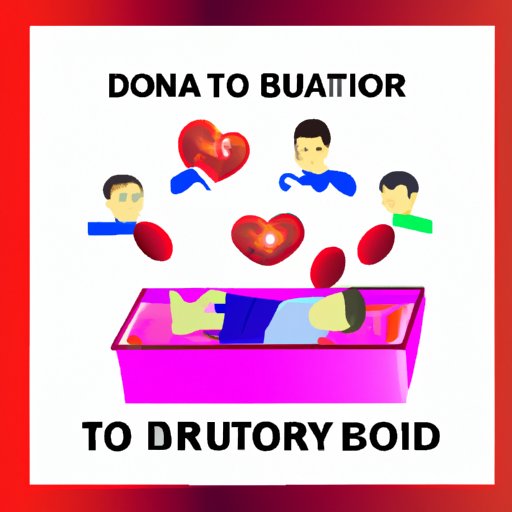Have you ever considered donating your body to science after you’ve passed? It’s a decision that many face, often prompting contemplation about the afterlife and the impact we leave on the world. While it’s a personal choice, some find themselves questioning whether such an act aligns with their religious beliefs. This article explores the complexities surrounding the act of body donation, delving into both ethical and religious perspectives to help you navigate this sensitive topic with informed clarity.

Image: bindscience.com
The idea of donating your body after death might seem unusual at first. But it’s an act of remarkable generosity that advances medical research, allowing students and scientists to learn and potentially save lives through the insights your body offers. This practice plays a crucial role in pushing the boundaries of medical knowledge, paving the way for better treatments and cures for diseases. However, for some, religious beliefs and cultural traditions intertwine with the idea of body disposition, creating a complex landscape of considerations.
Exploring Religious Perspectives
The question of whether donating your body to science is a sin hinges heavily on your specific faith. Different religions hold varying beliefs about the sanctity of the human body and rituals surrounding death. Let’s delve into some key religious perspectives:
Christianity
In Christianity, the body is considered a vessel for the soul, but it’s also seen as a gift from God. The Bible doesn’t explicitly address donating a body to science, and views vary depending on specific denominations:
- Catholicism: The Catholic Church generally encourages the respectful treatment of the deceased, but it doesn’t explicitly forbid body donation for scientific purposes. As long as the donation aligns with the dignity of the human body and doesn’t violate any religious precepts, it’s often considered permissible.
- Protestantism: Protestant denominations tend to have a broader range of interpretations. Some see body donation as a selfless act of kindness, aligning with Christian values of service and helping others. Others hold reservations, emphasizing the importance of burial and maintaining bodily integrity post-death.
Islam
Islam mandates the respectful treatment of the deceased, with burial as the preferred method of burial. The practice of donating the body to science is not explicitly permitted in Islamic teachings. Muslims believe the body should be left intact after death, allowing for a natural and undisturbed decomposition.

Image: www.lihpao.com
Judaism
Judaism also emphasizes the sanctity of the body and requires burial within a reasonable timeframe. The traditional practice is to bury the deceased whole and intact, as desecration of the body is frowned upon. However, there is some flexibility in Jewish traditions, and individual rabbis may offer guidance on specific situations.
Buddhism
Buddhism doesn’t explicitly prohibit donating the body to science. The focus in Buddhism is on the cycle of rebirth and the pursuit of enlightenment. While respecting the deceased is emphasized, the concept of the body as a temporary vessel aligns with certain aspects of body donation. It’s essential to consult with Buddhist teachers or leaders for individual interpretations.
Ethical Considerations and Individual Choice
Beyond religious perspectives, there are ethical considerations to weigh. One significant ethical concern is ensuring informed consent. Individuals must be fully informed about the process and potential risks involved in body donation. Transparency and clear communication are crucial to respecting the individual’s autonomy and choice.
Another ethical aspect is the treatment of the body. Donated bodies are used for scientific research and medical training, which may involve procedures that some might view as disrespectful. However, ethical guidelines and regulations are in place to ensure the treatment of the deceased remains respectful throughout the process.
Ultimately, the decision of whether or not to donate your body to science is deeply personal. It’s crucial to engage in self-reflection, consider your own values and beliefs, and potentially even seek guidance from religious leaders or trusted advisors. There’s no right or wrong answer, but informed decision-making is vital to ensure that your final decision aligns with your own convictions.
Making an Informed Choice: Resources and Information
If you’re considering donating your body to science, it’s crucial to understand the process and your options. Here are some resources that can provide valuable information and guidance:
- University Anatomy Departments: Many universities have programs that accept body donations for anatomical study and research. Contact your local university’s anatomy department for more information.
- National Body Donation Program (US): This organization connects individuals interested in body donation with reputable institutions.
- Your Religious Leader: Consulting with your religious leader can offer insights and guidance from your faith’s perspective.
Is It A Sin To Donate Your Body To Science
Conclusion
Donating your body to science is a powerful act of generosity that can benefit future generations. It requires careful consideration of both ethical and religious implications. While your decision is ultimately yours, engaging in informed research, seeking guidance from trusted individuals, and reflecting on your personal values can lead to a decision that aligns with your beliefs and leaves a legacy of compassion and scientific progress. Remember, your contribution can help pave the way for a brighter future for everyone.






